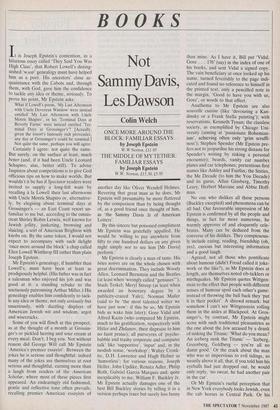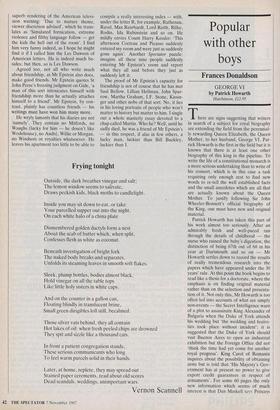BOOKS
It is Joseph Epstein's contention, in a hilarious essay called 'They Said You Was High Class', that Robert Lowell's disting- uished 'WASP' genealogy must have helped him as a poet. His ancestors' close ac- quaintance with the Cabots and, through them, with God, gave him the confidence to tackle any idea or theme, seriously. To prove his point, Mr Epstein asks:
What if Lowell's poem, 'My Last Afternoon with Uncle Devereux Winslow' were instead entitled 'My Last Afternoon with Uncle Morris Shapiro', or his 'Terminal Days at Beverly Farms' were instead entitled 'Ter- minal Days at Grossinger's'? [Actually, given the resort's famously rich provender, any day at Grossinger's could be terminal.] Not quite the same, perhaps you will agree.
Certainly I agree: not quite the same. But surely, on the surface at least, much better (and, if it had been Uncle Leonard Schapiro, alas, better still). To advise Jaspistos about competitions is to give God officious tips on how to make worlds. But wouldn't it be fun if Spectator readers were invited to supply a long-felt want by recalling a la Lowell their last afternoons with Uncle Morris Shapiro or, alternative- ly, by elegising about terminal days at Grossinger's — an East Coast resort un- familiar to me but, according to the omnis- cient Shirley Robin Letwin, well known for Jewish jollity, junketing, browsing and sluicing, a sort of American Brighton with knobs on. By the same token, I would not expect to accompany with such delight `once more around the block' a chap called Eliot Lowell Winthrop III rather than plain Joseph Epstein.
Mr Epstein's genealogy, if humbler than Lowell's, must have been at least as prodigiously helpful. (His father was in fact a salesman who enjoyed his job and was good at it: a standing rebuke to the unctuously patronising Arthur Miller.) His genealogy enables him confidently to tack- le any idea or theme, not only seriously but unseriously, with dazzling displays of American Jewish wit and wisdom, argot and wisecracks.
Some of you will flinch at this prospect, as at the thought of a month at Grossin- ger's or pickled herring and sour cream at every meal. Don't, I beg you. Not without reason did George Will call Mr Epstein 'America's premier essayist'. Between the jokes he is serious and thoughtful: indeed many of the jokes are themselves at root serious and thoughtful, earning more than a laugh from readers of the American Scholar, where most of these pieces first appeared. An endearingly old fashioned, gentle and reflective tone often prevails, recalling premier American essayists of
Not Sammy Davis, Les Dawson
Colin Welch
ONCE MORE AROUND THE BLOCK: FAMILIAR ESSAYS by Joseph Epstein W. W Norton, £11.95 THE MIDDLE OF MY TETHER: FAMILIAR ESSAYS by Joseph Epstein w. w. Norton, £13.30, £5.95
another day like Oliver Wendell Holmes. Revering that great man as he does, Mr Epstein will presumably be more flattered by the comparison than by being thought of, as a good friend once thought of him, as 'the Sammy Davis Jr• of American Letters'.
By this sincere but poisoned compliment Mr Epstein was gratefully appalled. He would be 'willing to pay anywhere from fifty to one hundred dollars on any given night simply not to see him [Mr Davis] perform.'
Mr Epstein is clearly a man of taste. His betes noires are on the whole chosen with great discrimination. They include Woody Allen, Leonard Bernstein and the Beatles (at least when 'wrongly called "geniuses"'); Studs Terkel; Meryl Streep (at least when awarded an honorary degree by a publicity-crazed Yale); Norman Mailer (said to be 'the most talented writer we have just now': if this be so, Mr Epstein bids us wake him later); Gore Vidal and Alfred Kazin (who compared Mr Epstein, much to his gratification, respectively with Hitler and Zhdanov, their dispraise to him no faint praise); all purveyors of 'psycho- babble and trashy corporate and computer talk' like 'supportive', 'input' and, in the modish sense, `workshop'; Walter Cronk- ite, D.H. Lawrence and Hugh Hefner as `humorless'; for various reasons, Joseph Heller, John Updike, Renata Adler, Philip Roth, Gabriel Garcia Marques and, quite inexplicably to me, William F. Buckley Jr. Mr Epstein actually damages one of the best Bill Buckley stories by telling it in a version perhaps truer but surely less funny
than mine. As I have it, Bill put 'Vidal, Gore . . . 176' (say) in the index of one of his books, and sent Vidal a signed copy. The vain beneficiary at once looked up his name, turned feverishly to the page indi- cated and found no reference to himself in the printed text, only a pencilled note in the margin, 'Good to have you with us, Gore', or words to that effect.
Anathema to Mr Epstein are also nouvelle cuisine (like 'devouring a Kan- dinsky or a Frank Stella painting'); with reservations, Kenneth Tynan; the classless society, as exemplified by Chicago Uni- versity (aiming at 'passionate Bohemian- ism', achieving often only 'grim scruffi- ness'); Stephen Spender (Mr Epstein pre- fers not to jeopardise his strong distaste for Spender's writing by risking a personal encounter); beards, vanity car number plates and car telephones; pretentious first names like Ashley and Fairfax; the Sixties, the Me Decade (to him the You Decade) and its gurus, Allan Ginsberg, Timothy Leary, Herbert Marcuse and Abbie Hoff- man.
No one who dislikes all these persons (Buckley excepted) and phenomena can be all bad. Our favourable impression of Mr Epstein is confirmed by all the people and things, in fact far more numerous, he warmly approves of and eloquently cele- brates. Many can be deduced from the converse of his dislikes. They conspicuous- ly include eating, reading, friendship (oh, yes), curious but interesting information and a good laugh.
Agreed, not all those who pontificate about humour (didn't Freud called it joke- work or the like?), as Mr Epstein does at length, are themselves noted rib-ticklers or mirthquakes. Mr Epstein quotes Wittgen- stein to the effect that people with different senses of humour spoil each other's game: instead of throwing the ball back they 'put it in their pocket'. A shrewd remark: but somehow I can't see Wittgenstein rolling them in the aisles at Blackpool. At Gros- singer's, by contrast, Mr Epstein might score with such traditional pleasantries as the one about the Jew accused by a drunk of sinking the Titanic: 'What do you mean? An iceberg sunk the Titanic' — 'Iceberg, Greenberg, Goldberg — you're all no damn good.' Or the crack about the man who was so impervious to evil tidings, so wearily above it all, that, if you told him his eyeballs had just dropped out, he would only reply, `no sweat, he had another pair in the car'.
Or Mr Epstein's rueful perception that in New York everybody looks Jewish, even the cab horses in Central Park. Or his superb rendering of the American televi- sion warning: 'Due to mature theme, viewer discretion advised', which he trans- lates as 'Simulated fornication, extreme violence and filthy language follow — get the kids the hell out of the room'. I find him very funny indeed, as I hope he might find it if I called him the Les Dawson of American letters. He is indeed much be- sides: but then, so is Les Dawson.
Agreed too, not all who write much about friendship, as Mr Epstein also does, make good friends. Mr Epstein quotes St John Perse's freezing judgment on Gide, 'a man of this sort intoxicates himself with friendship more than he actually attaches himself to a friend'. Mr Epstein, by con- trast, plainly has countless friends — his writings must have won him many more.
He wryly laments that his diaries are not 'namely'. They contain no Mitfords, no Waughs (lucky for him — he dosen't like Wodehouse), no Andre, Willie or Morgan, no Windsors or royalties whatsoever. He leaves his apartment too little to be able to compile a really interesting index — with, under the letter R, for example, Rathenau, Ravel, Max Reinhardt, Lord Reith, Rilke, Rodin, Ida Rubinstein and so on. He mildly envies Count Harry Kessler: 'This afternoon Cocteau and Picasso suddenly entered my room and were just as suddenly gone again'. Another Spectator puzzle: imagine all these nine people suddenly entering Mr Epstein's room and report what they all said before they just as suddenly left it.
The proof of Mr Epstein's capacity for friendship is not of course that he has met Saul Bellow, Lillian Hellman, John Spar- row, Martha Graham, I.F. Stone, Kissin- ger and other nobs of that sort. No, it lies in his loving portraits of people who won't matter to history but matter to him. I single out a whole masterly essay devoted to a chap called Martin. Who he? Well, until he sadly died, he was a friend of Mr Epstein's — in this respect, if alas in few others, a lucky man, luckier than Bill Buckley, luckier than I.



































































 Previous page
Previous page